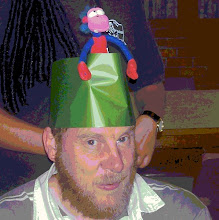Tuesday, October 14, 2008
1000 word reflection
No this isn't the reflection because the reflection is already posted. Just scroll down until you find the post entitled How This Course has Impacted me. If anyone wants to make a comment I would love to read it.
Don
Thursday, October 9, 2008
resources for storytelling
Go to EchotheStory
Enjoy,
Don
Storytelling site
In the meantime this is one of his posts that I enjoyed.
Don
The Bible is a wikistory – a mashup of stories
by Michael Novelli | August 18 2008 11:15 PM
It’d be nice if the Bible read like a novel from cover to cover. But it’s not a novel. It’s a series of books that have been grouped together—and many of them are out of chronological order.
In technological terminology, a mashup is a Web application that combines data from more than one source into a single integrated tool. The Bible is like this—a mashup of different writings from different authors inspired to tell the unified Story of God and his love for people.
In a recent talk, author Scot McKnight suggested we look at the Bible as a “Wikistory,” in which there is “ongoing reworking of the biblical story by new authors who each tell the story in their own way.” McKnight continued, “None [of the books of the Bible] is exhaustive, comprehensive or absolute...they are different stories of THE Story. We don’t have to harmonize them or try to reconcile them. They’re just doing their own versions of the Story, and each has a place in the larger picture.”
Let’s face it—the Bible is often difficult to read and to teach. We’ve got our work cut out for us if we wish to give our students a sense of its overarching story. That’s why storying is the best way I’ve found to give people, young and old alike, a Bible overview with context to all future Bible learning.
(Excerpted from my forthcoming book, Shaped by the Story)
Wednesday, October 8, 2008
How this course has impacted me
I approached this course with mixed motives, mixed feelings and mixed expectations. It would be good to do an intensive which helps get the work out of the way quickly and also enforces a time restriction. I also wanted to learn more about a post-modern context. Apart from the personal there was also the motive of another area of knowledge that would benefit Worldview (the training college where I am on staff).
The course with Steve though showed me a flaw in all of this as valuable and effective as it has been. This flaw was maintaining control. I used all these methods to communicate what I had already decided was important. The methods might have been novel but it was still the expert passing on his knowledge. The major impact on me was the need to work with others to find the meaning for the community. The need to be humble enough to put the word their before the community in a powerful way but allow others to interact with the word and see what it had to say to the community.
I was able to put a small part of this into practice both on Sunday when preaching in a bretheren church and on Wednesday when leading our staff’s prayers. When asked to write 1000 words of exegetical notes on Luke 1:39-45 I really wondered if I could find enough in it. When we worked on it together I was amazed at the amount we wrote on the whiteboard but still wasn’t convinced about its impact on lives. As we worked on it in our group it worked its way deeper into my soul and the flesh and blood reality of it began to affect me. I now treasure that small passage.
At the bretheren church I asked people to identify how they would feel as the various characters. A number of the older women spoke up (usually a no no) and as we looked at Mary the younger ones spoke up, and also the men identified with Zacharias. As a congregation we could then share about where joy originates, what it is to be blessed and a number of issues. The time flew by and people spoke to me positively afterwards.
Tuesday, October 7, 2008
Wow what a week. It was great. Thanks Steve for some great teaching, thanks fellow learners it was a privilege to be with you.
Some of my background. As you may have noticed I am no spring chicken. I am a boomer, born in 1956 in
At 17 I was confronted by the verse in 1 John 4:19 and now knew that this God that I had always suspected of existing but absent was not only present but loved me. I became a believer but it took a couple more years before I twigged that it should cause a change in my behaviour. When it twigged I had a desire to live my life for him.
The cool welcome back in Tassie confirms the need for global warming.
Don
Because when the word sprung to mind I looked up the definition and found it fits rather well. It can mean a new convert and I am a new convert to blogging after being on the sidelines for a while. It can also mean novice of a religious order and I can twist that to fit with my new role as a lecturer at a residential training centre. It also can be applied to a beginner and I identify myself as such when it comes to understanding the post-modern, emerging and emergent movements. I trust this course is just the start of an exciting journey.
Don
